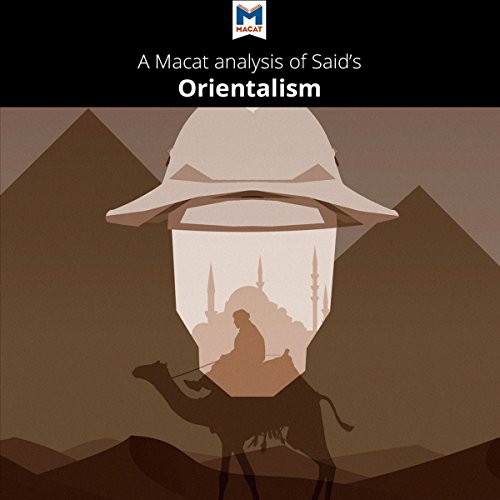
Analysis: A Macat Analysis of Edward Said's Orientalism
Failed to add items
Add to Cart failed.
Add to Wish List failed.
Remove from wishlist failed.
Adding to library failed
Follow podcast failed
Unfollow podcast failed
3 months free
Buy for $6.95
No default payment method selected.
We are sorry. We are not allowed to sell this product with the selected payment method
-
Narrated by:
-
Macat.com
-
By:
-
Riley Quinn
A Macat analysis of Edward Said's Orientalism
New York: Vintage Books, 1979
Western thinking about the Middle and Far East has been distorted by stereotype and inaccuracy. This argument lies at the center of Palestinian-American literary theorist Edward Said's groundbreaking book, Orientalism. Originally published in 1978, it cemented Said's reputation as the father of postcolonial studies.
Drawing on a wide range of sources, Said offered a new conceptual framework, as well as new language with which the (formerly) colonized could respond to colonial power and contest the way they were subjugated and represented. Orientalism opposes dominant ways of understanding the world, and calls directly for the West to account for its actions and assumptions.
Orientalism has had a profound impact, prompting both academics and politicians to reexamine their beliefs about everything from global power dynamics and the legacies of colonialism, to Western political, economic, and cultural dominance. People working in disciplines ranging from art history to sociology have since expanded on Said's original arguments to address such issues as class, gender, and race.
You can find out more about how Said's ideas have been challenged and applied - and how his work has impacted on thinkers in other academic disciplines - by exploring further in the Macat Library.
Macat's analyses cover 14 different subjects in the humanities and social sciences.
Macat. Learn better. Think smarter. Aim higher.
©2016 Macat Inc (P)2016 Macat IncListeners also enjoyed...




















I debated if I should read this book before or after. I think that after”Orientalism “ works better.
It is a very interesting view on Edward Said’s book. I highly recommend reading both books.
I also recommend to look into the different Macat Analysis.
My wish is that Audible will release more books by Edward Said.
My thanks to all involved, JK.
INTERESTING
Something went wrong. Please try again in a few minutes.



